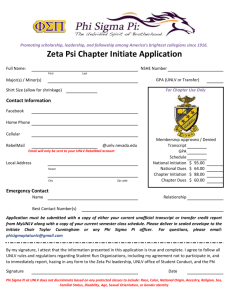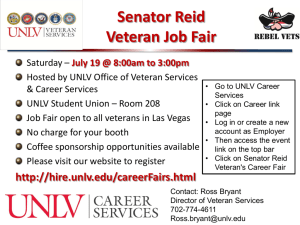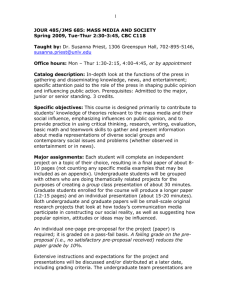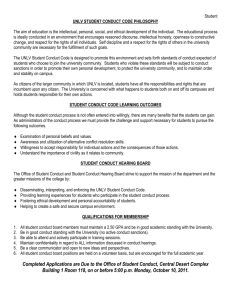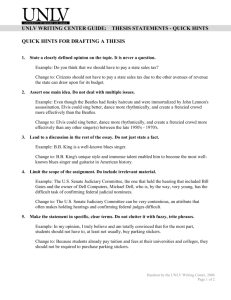HIS 416B/617B The U.S. Since 1945 Dr. Moehring Phone: 895
advertisement
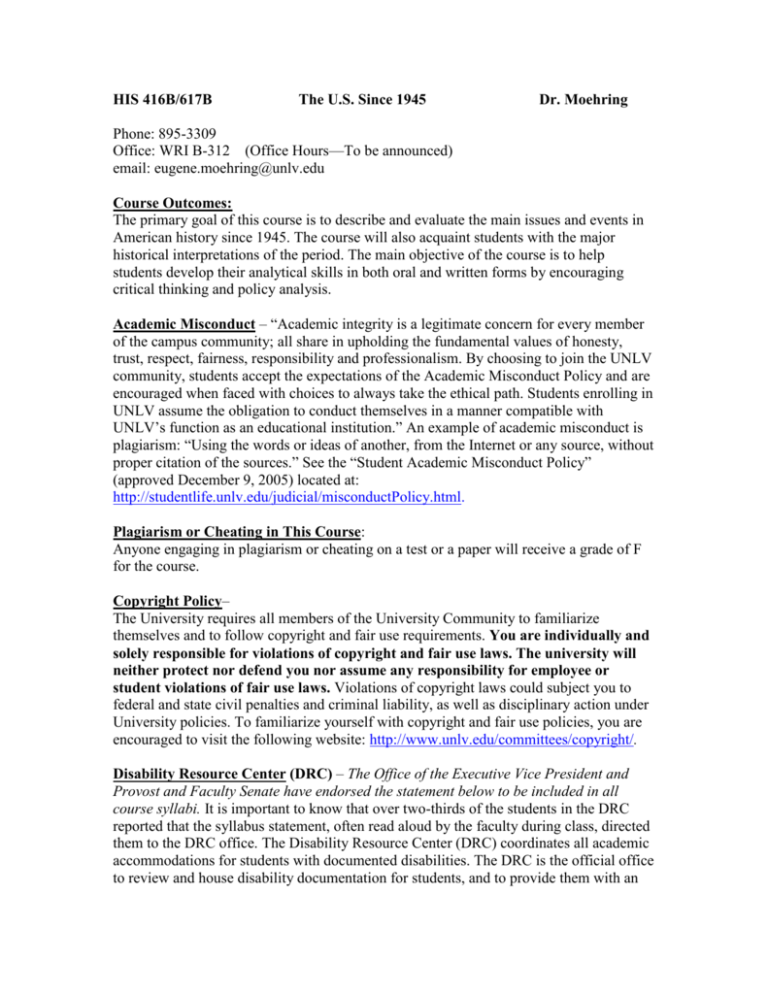
HIS 416B/617B The U.S. Since 1945 Dr. Moehring Phone: 895-3309 Office: WRI B-312 (Office Hours—To be announced) email: eugene.moehring@unlv.edu Course Outcomes: The primary goal of this course is to describe and evaluate the main issues and events in American history since 1945. The course will also acquaint students with the major historical interpretations of the period. The main objective of the course is to help students develop their analytical skills in both oral and written forms by encouraging critical thinking and policy analysis. Academic Misconduct – “Academic integrity is a legitimate concern for every member of the campus community; all share in upholding the fundamental values of honesty, trust, respect, fairness, responsibility and professionalism. By choosing to join the UNLV community, students accept the expectations of the Academic Misconduct Policy and are encouraged when faced with choices to always take the ethical path. Students enrolling in UNLV assume the obligation to conduct themselves in a manner compatible with UNLV’s function as an educational institution.” An example of academic misconduct is plagiarism: “Using the words or ideas of another, from the Internet or any source, without proper citation of the sources.” See the “Student Academic Misconduct Policy” (approved December 9, 2005) located at: http://studentlife.unlv.edu/judicial/misconductPolicy.html. Plagiarism or Cheating in This Course: Anyone engaging in plagiarism or cheating on a test or a paper will receive a grade of F for the course. Copyright Policy– The University requires all members of the University Community to familiarize themselves and to follow copyright and fair use requirements. You are individually and solely responsible for violations of copyright and fair use laws. The university will neither protect nor defend you nor assume any responsibility for employee or student violations of fair use laws. Violations of copyright laws could subject you to federal and state civil penalties and criminal liability, as well as disciplinary action under University policies. To familiarize yourself with copyright and fair use policies, you are encouraged to visit the following website: http://www.unlv.edu/committees/copyright/. Disability Resource Center (DRC) – The Office of the Executive Vice President and Provost and Faculty Senate have endorsed the statement below to be included in all course syllabi. It is important to know that over two-thirds of the students in the DRC reported that the syllabus statement, often read aloud by the faculty during class, directed them to the DRC office. The Disability Resource Center (DRC) coordinates all academic accommodations for students with documented disabilities. The DRC is the official office to review and house disability documentation for students, and to provide them with an 2 official Academic Accommodation Plan to present to the faculty if an accommodation is warranted. Faculty should not provide students accommodations without being in receipt of this plan. UNLV complies with the provisions set forth in Section 504 of the Rehabilitation Act of 1973 and the Americans with Disabilities Act of 1990, offering reasonable accommodations to qualified students with documented disabilities. If you have a documented disability that may require accommodations, you will need to contact the DRC for the coordination of services. The DRC is located in the Student Services Complex (SSC), Room 137, and the contact numbers are: Voice (702) 895-0866, TTY (702) 895-0652, fax (702) 895-0651. For additional information, please visit: http://studentlife.unlv.edu/disability/. UNLV Writing Center--One-on-one or small group assistance with writing is available free of charge to UNLV students at the Writing Center, located in CDC-3-301. Although walk-in consultations are sometimes available, students with appointments will receive priority assistance. Appointments may be made in person or by calling 895-3908. The student’s Rebel ID Card, a copy of the assignment (if possible), and two copies of any writing to be reviewed are requested for the consultation. More information can be found at: http://writingcenter.unlv.edu/ Religious Holidays Policy – Any student missing class quizzes, examinations, or any other class or lab work because of observance of religious holidays shall be given an opportunity during that semester to make up missed work. The make-up will apply to the religious holiday absence only. It shall be the responsibility of the student to notify the instructor no later than the end of the first two weeks of classes, February1, 2013, of his or her intention to participate in religious holidays which do not fall on state holidays or periods of class recess. This policy shall not apply in the event that administering the test or examination at an alternate time would impose an undue hardship on the instructor or the university that could not reasonably been avoided. For additional information, please visit: http://catalog.unlv.edu/content.php?catoid=4&navoid=164. Incomplete Grades - The grade of I – Incomplete – can be granted when a student has satisfactorily completed all course work up to the withdrawal date of that semester/session but for reason(s) beyond the student’s control, and acceptable to the instructor, cannot complete the last part of the course, and the instructor believes that the student can finish the course without repeating it. A student who receives an I is responsible for making up whatever work was lacking at the end of the semester. If course requirements are not completed within the time indicated, a grade of F will be recorded and the GPA will be adjusted accordingly. Students who are fulfilling an Incomplete do not register for the course but make individual arrangements with the instructor who assigned the I grade. Tutoring – The Academic Success Center (ASC) provides tutoring and academic assistance for all UNLV students taking UNLV courses. Students are 3 encouraged to stop by the ASC to learn more about subjects offered, tutoring times and other academic resources. The ASC is located across from the Student Services Complex (SSC). Students may learn more about tutoring services by calling (702) 895-3177 or visiting the tutoring web site at: http://academicsuccess.unlv.edu/tutoring/. Rebelmail – By policy, faculty and staff should e-mail students’ Rebelmail accounts only. Rebelmail is UNLV’s official e-mail system for students. It is one of the primary ways students receive official university communication such as information about deadlines, major campus events, and announcements. All UNLV students receive a Rebelmail account after they have been admitted to the university. Students’ e-mail prefixes are listed on class rosters. The suffix is always @unlv.nevada.edu. Course Requirements: Students will read four books and we will have a class-long discussion of each of them during the semester. Study questions will be handed out several weeks in advance. There will be questions relating to these discussions on the midterm and final examinations. All students are expected to participate actively in class discussion. Failure to do so will result in the lowering of your final grade. Term Paper: Undergraduates will be asked to read three items (one of which must be a book) from the course bibliography and then write a review essay (of about 10-12 pages) in which they describe and, where appropriate, criticize the main findings and viewpoints of each author. Graduate students will select five items (two of which must be a book) and write 15-20 pages. Graduate student essays should be written at a higher level than the rest of the class and should be patterned after the review essays often found in history journals. We will discuss this further after class. Any student may also write an original paper based on primary sources. See me about this if you are interested. Papers are due the last day of class. Grades: Grades will be determined primarily by your performance on the midterm and final examinations. Once a grade is calculated, your term paper can raise or lower the grade to the next level. For example, a grade of B+ would become an A- with a good term paper. A great paper could bump the grade higher. Extraordinary discussion, in which a student answers questions in each class discussion, will add the next letter grade to the final course grade—a B+ will therefore become an A-. Religious Holidays: Tests will not be given on a major religious holiday or during "study week" (the last week of class). 4 Handouts: Many course handouts can be found on my website, http://faculty.unlv.edu/wpmu/emoehring/. Click on appropriate course webpage; links to handouts are embedded in the course syllabus on the left side of the page. Lecture Guides: The lecture guides for each half of the course are more like an outline of the lecture, listing what will be discussed. They are not lecture notes and do not take the place of lecture notes. On exams it won’t be enough to mention, for example, the Taft-Hartley Act of 1947 or the Landrum-Griffin Act of 1958. You will have to explain what they did and why they were significant. To do that, you will need to be in class and take good lecture notes. Examination Review Guides: These will not list the questions to be asked on the test, but will instead review what was important in the lectures and encourage you to master that information. Examinations: All exams will be essay and are not cumulative. So, The Midterm will cover the first half of the course and the first two books, and the Final Exam will cover the last half and the last two books. Attendance: While I do not take attendance in class, I expect you to be there! Anyone can miss a class or two because of illness or a personal emergency. But if I see that you are absent from class more than a few times during the semester, I will lower your final course grade accordingly! ________________________________________________ Required Readings: David Halberstam, Ho Michael Harrington, The Other America Harvard Sitkoff, The Struggle for Black Equality, 1954-1992 Arthur Schlesinger, Jr. The Disuniting of America _____________________ Lecture Topics: The Truman Years: Demobilization and Domestic Controversy Origins of the Cold War: Yalta to Korea, 1945-1953 McCarthyism and the Assault on Civil Liberties--Read Halberstam Containment in Crisis: The Eisenhower Years, 1953-1960 America and the "Organization Man:" The Mass Society Mass Media: Its Critics and the Cult of Marshall McLuhan The "Affluent Society:" Economic Development Since WWII 5 The "Other America"--Read Harrington "Up from the Pedestal": Rise of the Modern Feminist Movement The Warren Court and the Expansion of Civil Liberties Midterm Examination--Date to be Announced ____________________ The Charismatic President: John F. Kennedy: The Man and the Myth The "Great Society": A Forgotten Achievement The "Tragedy of Lyndon Johnson: Vietnam, Violence, and Protest Dissent and Non-Conformity: The Rise of a Counter Culture Martin Luther King and the Black Revolution--Read Sitkoff The Modern Urban Crisis; Suburbs, Ghettos, and Megalopolis The "Closing Circle;" America's Ecological Crisis Henry Kissenger and the Politics of Detente--Read Schlesinger The Imperial Presidency Dethroned: Richard Nixon's Last Crisis Cold War into Terrorist War: 1975-Present Curtain Call for Liberalism?: Carter to Obama Final Examination--Date to be Announced or see UNLV Final Exam Schedule On Reserve: Eric Foner, Give Me Liberty: An American History Volume 2 (see the chapters covering events after 1945)
